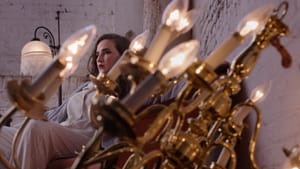Stay in the Loop
BSR publishes on a weekly schedule, with an email newsletter every Wednesday and Thursday morning. There’s no paywall, and subscribing is always free.
Opera as performance art
Opera Philadelphia presents Caroline Shaw and Anne Carson’s ‘We Need to Talk’

The highly lauded composer Caroline Shaw is artistically outgoing and musically embracing, often taking the myriad bombarding influences we might ignore, and making music from them. The highly lauded poet Anne Carson is a classicist, steeped in Greek drama and ancient references, whose inward-facing, highly personal look at the world results in poems redolent with mystery. But both artists are known for their genre-crossing work, and the two women found mutually fertile creative ground in We Need to Talk, the fourth and final offering in Opera Philadelphia’s exciting spring 2021 season of digital commissions.
Intensity, beauty, defiance
The film’s title is that of Carson’s recent 64-line poem (which Shaw sets in its entirety), a throbbingly intense, dense quasi-dialogue. Between or among whom? The poet leaves the reader to decipher (or not) in a work rife with unsettling images (“I played with your skull. I broke your energy”) and contradictions (“I invented your gravity”). Shaw, gifted at finding new things to say musically no matter what medium she assays, has tapped effortlessly into the eeriness of this expansive poem. Her approach to its intensity is purely her own, equally ethereal and down-to-earth, both mercurial and grounded.
These two artists are amply served in a rich film by Maureen Towey that ranges visually from unsettled exploration to near triumph, from apples (of Eden?) to shards of pottery and drips of water with a life of their own. There’s a tantalizing glimpse of a Walt Disney bio as (channeling Maleficent) soprano Ariadne Greif matches the film’s rangy content frame-to-frame with vocal beauty and a delicious defiance. Alternately singing and silent, barefoot and with a slash of red lipstick, Greif’s visceral portrait of a woman in conflict (with herself? with someone else?) is both unpredictable and mesmerizing.
Performance art
The work itself is also changeable: sometimes lambent, sometime mordant, continually arresting. Opera Philadelphia describes the work in traditional terms, but it quickly moves out of the recognizable operatic arena. Amplified by Towey’s visuals, and grounded in Greif’s compelling performance, We Need to Talk soon morphs into performance art.
As Grief bites tantalizingly into one of those red apples and delightedly manipulates her vowels to convey the poem’s shifting emotions, a background chorale (sung by Shaw) and the poem’s words (recited by Carson) ripple in and out. Sometimes it’s Carson in the foreground, reciting her own words in the poetically sanctioned flat-delivery “poet reading” style, who finishes Greif’s sung phrases. Sometimes it’s Shaw’s choral cadenced music that comes to the fore, while the singer silently drags furniture, lugs a rug, balances a load of glassware, and sets up a sort of living space in the corner of an empty, bedraggled loft. And sometimes it’s Greif who takes the musical lead.
An aural appetite
In her concert-oriented compositions, Shaw always seems to take delight in the aural world that she creates and presents, and even in this moody piece, that sense of appetite is certainly present. Not only did she write the notes that constitute the work’s “music,” offering Greif a rich vocal palette, but the creatively omnivorous composer also sang her own background vocals, played the keys and strings, did the looping and sampling (of scores from old films), and served as playback engineer.
We Need to Talk is a bricolage, the film assembled masterfully from a diverse but recognizable array—words, music, furniture, glassware, anxiety, conflict, myth, and triumph. Setting Carson’s richly tactile poem, Shaw has written a score both opaque and pellucid for a film that leaves the viewer with just as many uncertainties on exit as on entry. The film’s 11-minute length allows for multiple tries at solving the title puzzle. What it is we might need to talk about? Do we really need to talk at all? The composer, the poet, the singer, and the filmmaker do that. We can simply listen and be taken along. Answers are not the answer here. Questions are all.
Image description: A still from We Need to Talk shows soprano Ariadne Grief, a white woman wearing a light-colored outfit, sitting with a contemplative expression. She’s partially visible past a large golden chandelier tilting in the foreground.
What, When, Where
We Need to Talk. Music by Caroline Shaw, words by Anne Carson. Ariadne Greif, soprano. Premiere April 16, 2021 on Opera Philadelphia TV. Available through Monday, May 31, 2021 with subscription or individual ticket purchase. operaphila.org
Sign up for our newsletter
All of the week's new articles, all in one place. Sign up for the free weekly BSR newsletters, and don't miss a conversation.

 Gail Obenreder
Gail Obenreder